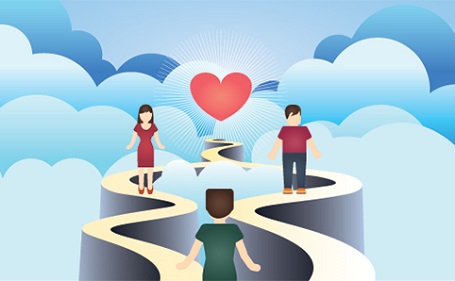Worldwide, bisexuality is overlooked. When it does make the spotlight, it's usually misrepresented. In Hong Kong, the chance of meeting someone who's bisexual is quite low. The different orientations that make up the LGBTI community stand by their particular identities with – no pun intended – pride. Meanwhile, 'bisexual' is an eight letter word that, for many, can still conjure up ideas of promiscuity, confusion or greed. People say 'straight till proven gay' when questioning an acquaintance's sexuality. What about the individuals that exist between those extremes?
In 1948, bisexual sex psychologist Alfred Kinsey published the Kinsey scale, which ranges from zero to six. Zero means you're exclusively heterosexual and six rates you as an exclusive homosexual. Everything in between basically means you are bisexual to varying degrees. Dr Kinsey used this scale to show that human sexuality is not clear cut.
Acceptance of the LGBTI community has skyrocketed since Kinsey's day. Locally, associations like HKU's Queer Straight Alliance, Les Peches and Out in HK have been formed to build awareness and support individuals within the community. Nevertheless, in Hong Kong, bisexuals remain an overlooked minority.
Standing up for your individuality
Human nature instructs us to categorise things in order to limit a perceived threat, making the multitude of variations within bisexuality difficult to deal with. Kash Manning, a 19-year-old bisexual female states, "More awareness of what bisexuality is, is needed. People assume it's a 50/50 deal. It's more complex than that – it differs for each individual." Bisexuality is used to signify an orientation that falls somewhere along the extremes of the sexual (physical) and romantic (who you are attracted to mentally) spectrums. Manning recounts her coming out experience. "I lived in a Muslim country. At 12, I told a friend that I was bisexual. The next day, an older kid told me I was 'on the road to damnation'." Despite this, she proclaims, "I never changed my label for other people, even when harassed about my sexuality."
Manning discusses an experience dating the opposite sex. "When I started seeing my first boyfriend, people were shocked, they assumed I was a lesbian because I had never dated a boy before." Manning then received questions like, "If you're dating a guy, do you become straight? And vice versa?" Such comments devalue her bisexual orientation according to Manning, and she concludes, "Problems in the LGBTI community shouldn't be compared. Instead, there should be more acceptance of different orientations."
Bisexuals in Hong Kong families
Karen Chiang, a 22-year-old bisexual female blogger at hellobella.com and a self-identified TBG – Tom Boy Girl – details her experience regarding her Cantonese family. "Older generations of locals don't really understand bisexuality," Chiang says. "Once you're gay you're gay, and that might come as a shock [to others], but if you're bi and end up marrying the opposite sex, everything is fine. Older generations tend to not accept gay people, so for appearances sake, I say I'm straight. My grandparents are in denial." This is a common mindset that resonates with younger generations. There are other issues too, as Chiang explains. "Sometimes partners of bisexuals may feel insecure, since bisexuals could falsely be seen as more likely to jump ship back to being 'straight' when they want children. Bisexuals are perceived as more unfaithful. [Heterosexuals sometimes] see bi-people as having more options because they're open to both sexes, which is not true. You like who you like, regardless of gender."
Romance vs sex
Ian (not his real name) identifies himself as a hetero-romantic bisexual. "It differs from typical ideas of bisexuality as I wouldn't have a same-sex relationship but I'd have a little same-sex fun." Hetero-romantic individuals are romantically attracted to members of the opposite sex, but are physically attracted to members of the same-sex. "Because I'm hetero-romantic, people don't think I count as bisexual. A large portion of my friends are part of the LGBTI community and some of them initially came out as bi before realising they were gay, so they don't take my bisexuality seriously."
As a result, Ian usually doesn't fit in. "If I'm presented with those that think of my bisexuality as bad, I choose not to identify. It creates issues, socially and physically that I don't want to deal with. So instead, I surround myself with loving people. There is no reason for you to be afraid to express yourself."












 打印版本
打印版本


















读者回应
请先登入再使用此功能。